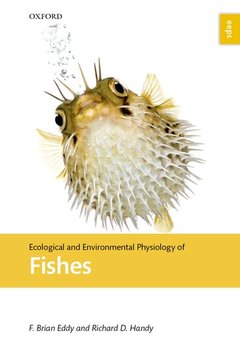Ecological and Environmental Physiology of Fishes Ecological and Environmental Physiology Series
Langue : Anglais
Auteurs : Eddy F. Brian, Handy Richard D.

Fishes have evolved to colonise almost every type of aquatic habitat and today they are a hugely diverse group of over 25,000 species. The evolution of this great diversity of species has resulted in a myriad of solutions to the demands posed by the aquatic environment. Ecological and Environmental Physiology of Fishes presents a current and comprehensive overview of fish physiology to demonstrate how living fishes function in their environment. As with other books in the Series, the emphasis is on the unique physiological characteristics of the fish, but with applications to questions of broad relevance in physiological ecology. A preliminary chapter introduces the aquatic environment and gives a general description of fish biology, evolution, and taxonomy. Subsequent sections discuss the particular problems of living in water, life in extreme environments, techniques for studying fish ecophysiology, and future research directions.
1. Introduction and Opening Remarks. 2. General Principles of Fish Physiology: Living in Water. 3. Extreme Environments. 4. Techniques and Applications. 5. Conclusions and Future Developments. References. Index.
F. Brian Eddy has researched and taught fish biology and physiology for over 40 years. After graduating from the University of London (B.Sc 1965), he worked and studied in the Freshwater Fisheries Laboratory, London until 1968, then completed a PhD at the University of Bristol (1971), followed by postdoctoral research at the University of Lancaster. He was appointed in 1974 as Lecturer in Zoology at the University of Dundee. Working with graduate and postdoctoral researchers, programmes on osmoregulation, respiration, and ecotoxicology of fish were conducted in Dundee, as well as with colleagues in Scotland, the UK, and overseas. The author has published over 120 research papers, reviews, and book chapters and presented numerous papers at conferences. In 2000 he was appointed Professor of Zoology at Dundee and awarded a D.Sc (University of Bristol). Richard D. Handy is currently Professor of Environmental Toxicology at The University of Plymouth and has taught fish biology, comparative physiology, and especially the effects of environmental change on fishes for more than 20 years. After graduating from the University of Birmingham, he studied for a PhD on fish ecotoxicology and trace metal physiology at the University of Dundee with Brian Eddy, and stayed at Dundee as a NERC fellow before moving to further post-doctoral positions at Heriot-Watt and then Edinburgh University. He moved to Plymouth in 1996. Richard is interested in mechanistic aspects of dysfunction in body systems during environmental stress, and fishes lend themselves to such whole organism biology. His laboratory also uses a range of in vitro models from fish. He has published over 100 experimental papers, reviews, and book chapters and with numerous contributions to conferences and international working groups.
Date de parution : 05-2012
Ouvrage de 264 p.
16.1x23.4 cm
Date de parution : 05-2012
Ouvrage de 264 p.
16.2x23.5 cm
Thèmes d’Ecological and Environmental Physiology of Fishes :
© 2024 LAVOISIER S.A.S.



